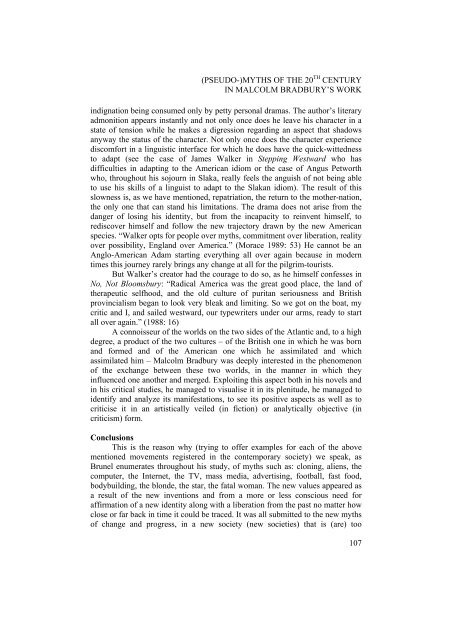culture, subculture and counterculture - Facultatea de Litere
culture, subculture and counterculture - Facultatea de Litere
culture, subculture and counterculture - Facultatea de Litere
Create successful ePaper yourself
Turn your PDF publications into a flip-book with our unique Google optimized e-Paper software.
(PSEUDO-)MYTHS OF THE 20 TH CENTURY<br />
IN MALCOLM BRADBURY’S WORK<br />
indignation being consumed only by petty personal dramas. The author’s literary<br />
admonition appears instantly <strong>and</strong> not only once does he leave his character in a<br />
state of tension while he makes a digression regarding an aspect that shadows<br />
anyway the status of the character. Not only once does the character experience<br />
discomfort in a linguistic interface for which he does have the quick-wittedness<br />
to adapt (see the case of James Walker in Stepping Westward who has<br />
difficulties in adapting to the American idiom or the case of Angus Petworth<br />
who, throughout his sojourn in Slaka, really feels the anguish of not being able<br />
to use his skills of a linguist to adapt to the Slakan idiom). The result of this<br />
slowness is, as we have mentioned, repatriation, the return to the mother-nation,<br />
the only one that can st<strong>and</strong> his limitations. The drama does not arise from the<br />
danger of losing his i<strong>de</strong>ntity, but from the incapacity to reinvent himself, to<br />
rediscover himself <strong>and</strong> follow the new trajectory drawn by the new American<br />
species. “Walker opts for people over myths, commitment over liberation, reality<br />
over possibility, Engl<strong>and</strong> over America.” (Morace 1989: 53) He cannot be an<br />
Anglo-American Adam starting everything all over again because in mo<strong>de</strong>rn<br />
times this journey rarely brings any change at all for the pilgrim-tourists.<br />
But Walker’s creator had the courage to do so, as he himself confesses in<br />
No, Not Bloomsbury: “Radical America was the great good place, the l<strong>and</strong> of<br />
therapeutic selfhood, <strong>and</strong> the old <strong>culture</strong> of puritan seriousness <strong>and</strong> British<br />
provincialism began to look very bleak <strong>and</strong> limiting. So we got on the boat, my<br />
critic <strong>and</strong> I, <strong>and</strong> sailed westward, our typewriters un<strong>de</strong>r our arms, ready to start<br />
all over again.” (1988: 16)<br />
A connoisseur of the worlds on the two si<strong>de</strong>s of the Atlantic <strong>and</strong>, to a high<br />
<strong>de</strong>gree, a product of the two <strong>culture</strong>s – of the British one in which he was born<br />
<strong>and</strong> formed <strong>and</strong> of the American one which he assimilated <strong>and</strong> which<br />
assimilated him – Malcolm Bradbury was <strong>de</strong>eply interested in the phenomenon<br />
of the exchange between these two worlds, in the manner in which they<br />
influenced one another <strong>and</strong> merged. Exploiting this aspect both in his novels <strong>and</strong><br />
in his critical studies, he managed to visualise it in its plenitu<strong>de</strong>, he managed to<br />
i<strong>de</strong>ntify <strong>and</strong> analyze its manifestations, to see its positive aspects as well as to<br />
criticise it in an artistically veiled (in fiction) or analytically objective (in<br />
criticism) form.<br />
Conclusions<br />
This is the reason why (trying to offer examples for each of the above<br />
mentioned movements registered in the contemporary society) we speak, as<br />
Brunel enumerates throughout his study, of myths such as: cloning, aliens, the<br />
computer, the Internet, the TV, mass media, advertising, football, fast food,<br />
bodybuilding, the blon<strong>de</strong>, the star, the fatal woman. The new values appeared as<br />
a result of the new inventions <strong>and</strong> from a more or less conscious need for<br />
affirmation of a new i<strong>de</strong>ntity along with a liberation from the past no matter how<br />
close or far back in time it could be traced. It was all submitted to the new myths<br />
of change <strong>and</strong> progress, in a new society (new societies) that is (are) too<br />
107












